University of Phoenix: Elon Musk's Innovative Leadership Analysis
VerifiedAdded on 2022/08/27
|6
|1827
|24
Report
AI Summary
This report provides an in-depth analysis of Elon Musk's leadership style, focusing on his transformational approach and its impact on Tesla and SpaceX. The report examines Musk's leadership through the lens of the Five-Factor Model, highlighting traits like agreeableness, extroversion, conscientiousness, emotional stability, and openness to experience. Real-life incidents from Musk's journey are discussed to illustrate his ability to overcome challenges and his risk-taking abilities. The report also explores how Musk's personality traits influence his leadership style, emphasizing his hard work, determination, and perseverance. Furthermore, it highlights Musk's ability to learn from failures and his inspiring approach to leadership, which has transformed the automotive industry and influenced millions. The report concludes by emphasizing the importance of innovative leadership in today's business environment, showcasing Musk as a role model for aspiring leaders. The report includes references for further study and analysis.
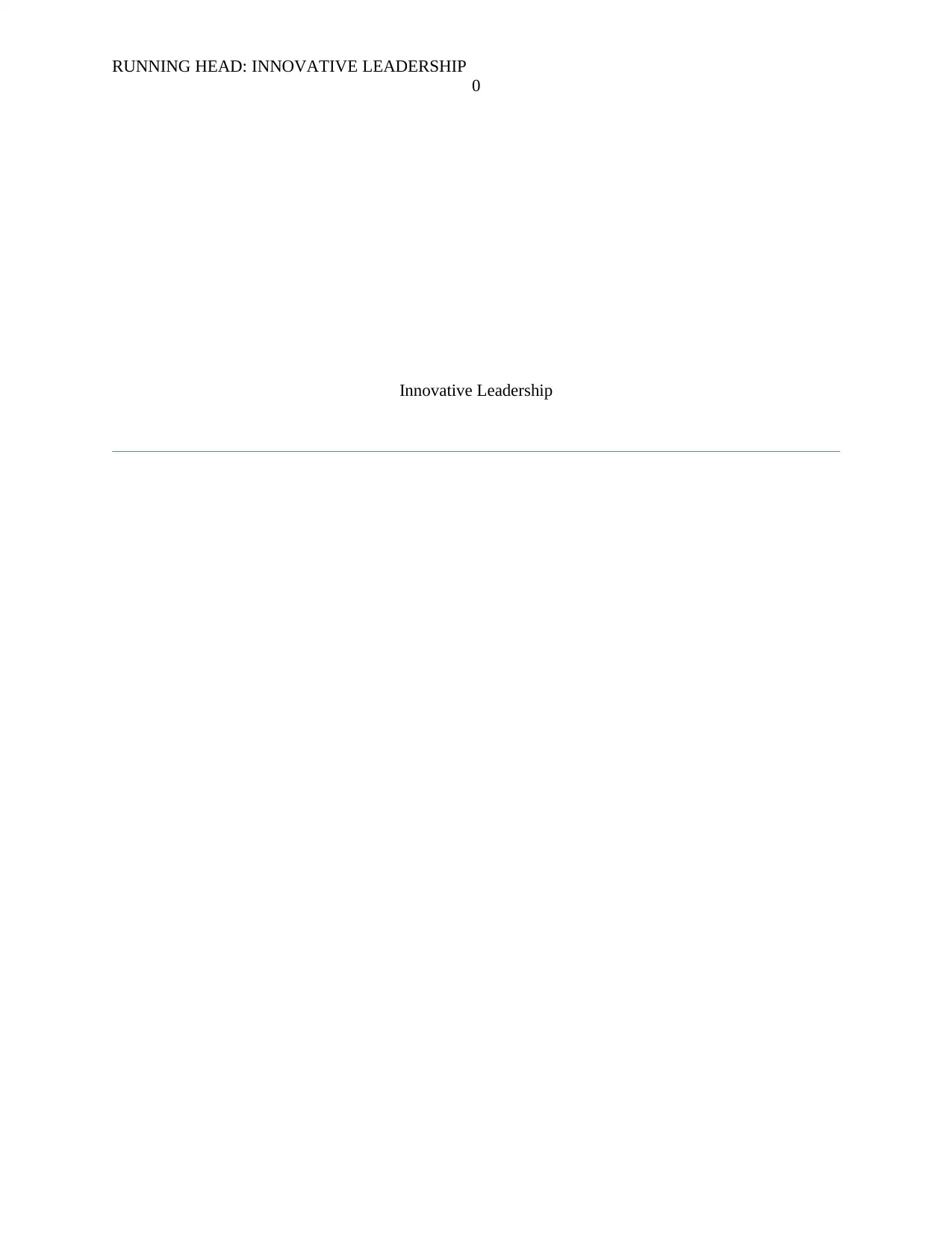
RUNNING HEAD: INNOVATIVE LEADERSHIP
0
Innovative Leadership
0
Innovative Leadership
Paraphrase This Document
Need a fresh take? Get an instant paraphrase of this document with our AI Paraphraser
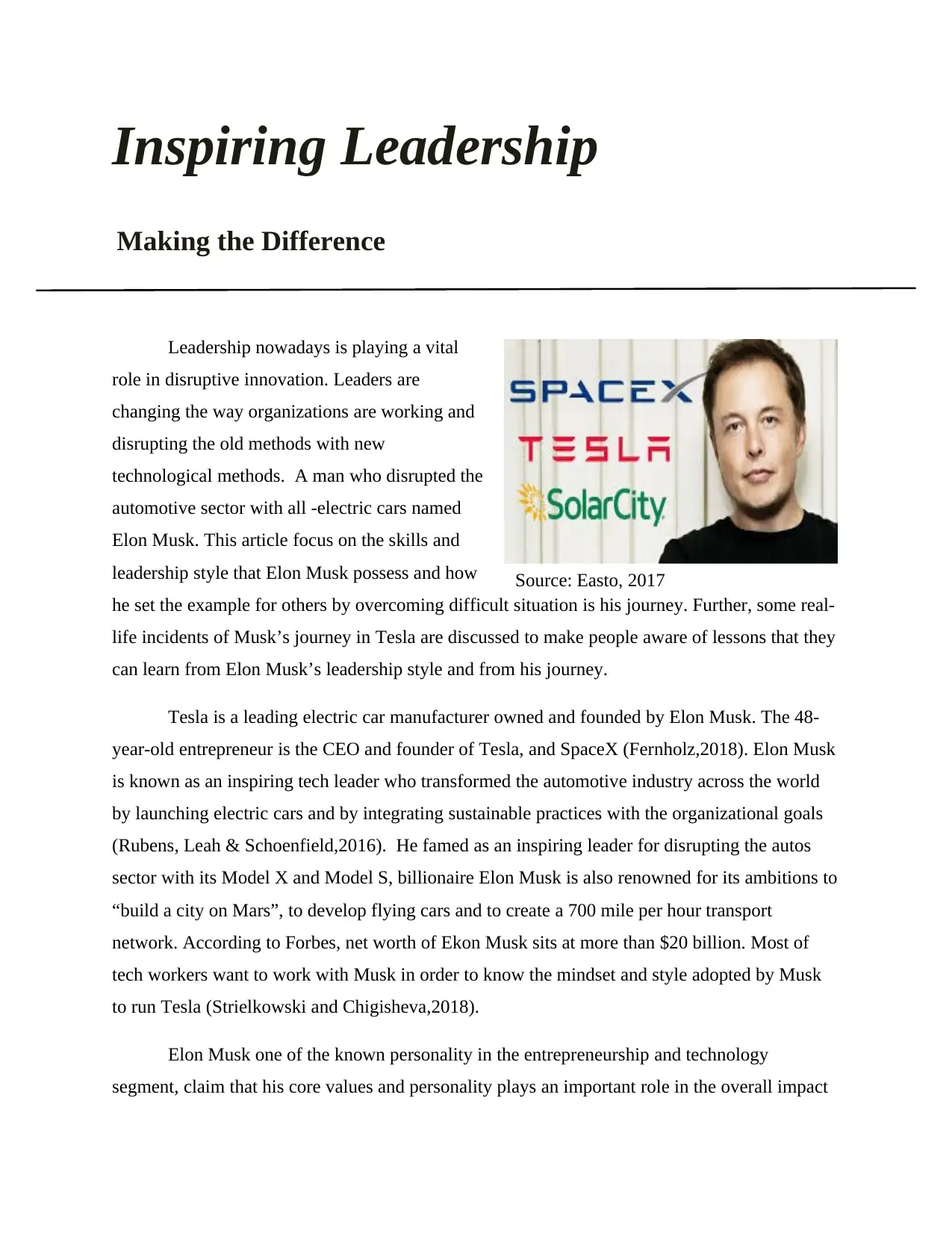
Inspiring Leadership
Making the Difference
Leadership nowadays is playing a vital
role in disruptive innovation. Leaders are
changing the way organizations are working and
disrupting the old methods with new
technological methods. A man who disrupted the
automotive sector with all -electric cars named
Elon Musk. This article focus on the skills and
leadership style that Elon Musk possess and how
he set the example for others by overcoming difficult situation is his journey. Further, some real-
life incidents of Musk’s journey in Tesla are discussed to make people aware of lessons that they
can learn from Elon Musk’s leadership style and from his journey.
Tesla is a leading electric car manufacturer owned and founded by Elon Musk. The 48-
year-old entrepreneur is the CEO and founder of Tesla, and SpaceX (Fernholz,2018). Elon Musk
is known as an inspiring tech leader who transformed the automotive industry across the world
by launching electric cars and by integrating sustainable practices with the organizational goals
(Rubens, Leah & Schoenfield,2016). He famed as an inspiring leader for disrupting the autos
sector with its Model X and Model S, billionaire Elon Musk is also renowned for its ambitions to
“build a city on Mars”, to develop flying cars and to create a 700 mile per hour transport
network. According to Forbes, net worth of Ekon Musk sits at more than $20 billion. Most of
tech workers want to work with Musk in order to know the mindset and style adopted by Musk
to run Tesla (Strielkowski and Chigisheva,2018).
Elon Musk one of the known personality in the entrepreneurship and technology
segment, claim that his core values and personality plays an important role in the overall impact
Source: Easto, 2017
Making the Difference
Leadership nowadays is playing a vital
role in disruptive innovation. Leaders are
changing the way organizations are working and
disrupting the old methods with new
technological methods. A man who disrupted the
automotive sector with all -electric cars named
Elon Musk. This article focus on the skills and
leadership style that Elon Musk possess and how
he set the example for others by overcoming difficult situation is his journey. Further, some real-
life incidents of Musk’s journey in Tesla are discussed to make people aware of lessons that they
can learn from Elon Musk’s leadership style and from his journey.
Tesla is a leading electric car manufacturer owned and founded by Elon Musk. The 48-
year-old entrepreneur is the CEO and founder of Tesla, and SpaceX (Fernholz,2018). Elon Musk
is known as an inspiring tech leader who transformed the automotive industry across the world
by launching electric cars and by integrating sustainable practices with the organizational goals
(Rubens, Leah & Schoenfield,2016). He famed as an inspiring leader for disrupting the autos
sector with its Model X and Model S, billionaire Elon Musk is also renowned for its ambitions to
“build a city on Mars”, to develop flying cars and to create a 700 mile per hour transport
network. According to Forbes, net worth of Ekon Musk sits at more than $20 billion. Most of
tech workers want to work with Musk in order to know the mindset and style adopted by Musk
to run Tesla (Strielkowski and Chigisheva,2018).
Elon Musk one of the known personality in the entrepreneurship and technology
segment, claim that his core values and personality plays an important role in the overall impact
Source: Easto, 2017
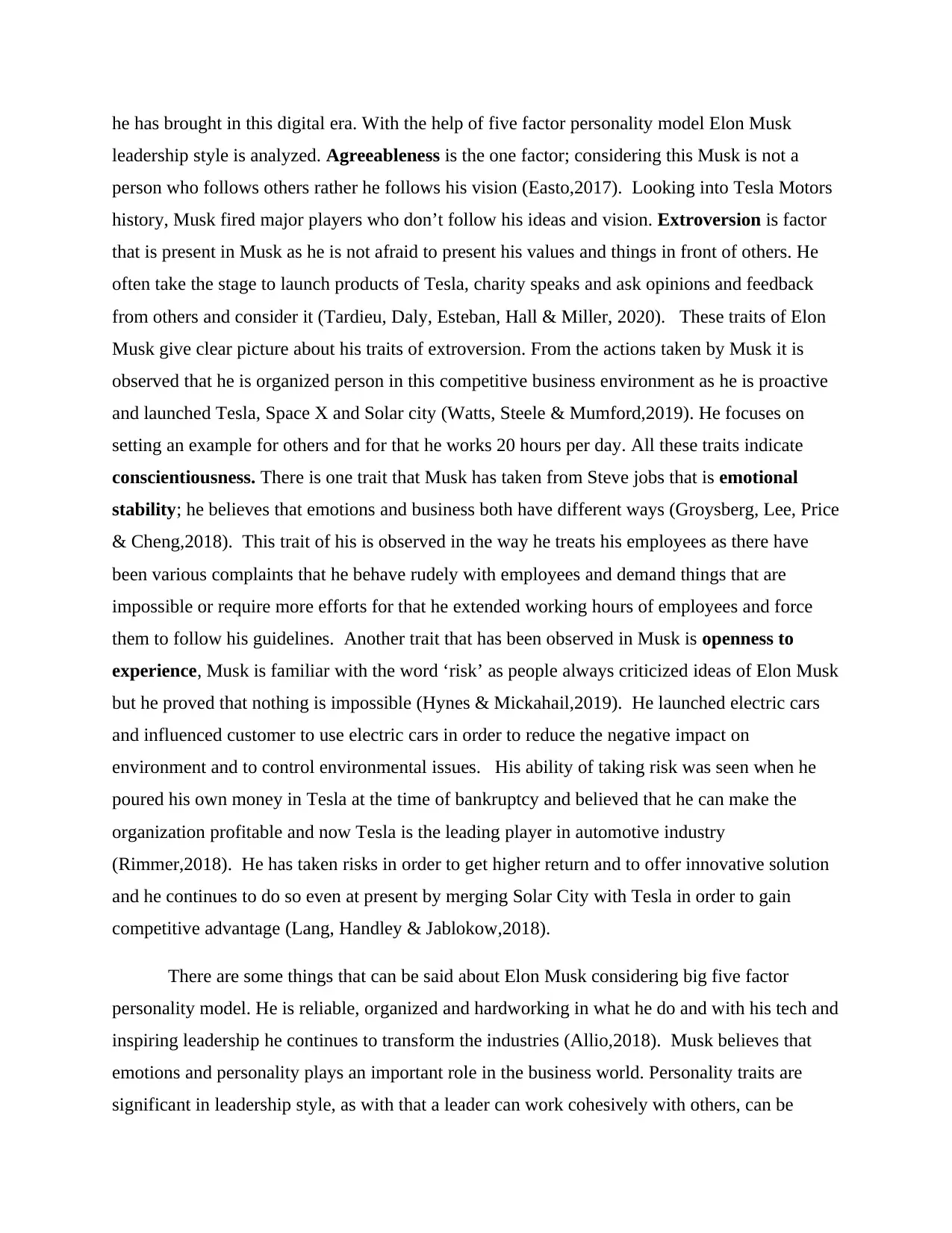
he has brought in this digital era. With the help of five factor personality model Elon Musk
leadership style is analyzed. Agreeableness is the one factor; considering this Musk is not a
person who follows others rather he follows his vision (Easto,2017). Looking into Tesla Motors
history, Musk fired major players who don’t follow his ideas and vision. Extroversion is factor
that is present in Musk as he is not afraid to present his values and things in front of others. He
often take the stage to launch products of Tesla, charity speaks and ask opinions and feedback
from others and consider it (Tardieu, Daly, Esteban, Hall & Miller, 2020). These traits of Elon
Musk give clear picture about his traits of extroversion. From the actions taken by Musk it is
observed that he is organized person in this competitive business environment as he is proactive
and launched Tesla, Space X and Solar city (Watts, Steele & Mumford,2019). He focuses on
setting an example for others and for that he works 20 hours per day. All these traits indicate
conscientiousness. There is one trait that Musk has taken from Steve jobs that is emotional
stability; he believes that emotions and business both have different ways (Groysberg, Lee, Price
& Cheng,2018). This trait of his is observed in the way he treats his employees as there have
been various complaints that he behave rudely with employees and demand things that are
impossible or require more efforts for that he extended working hours of employees and force
them to follow his guidelines. Another trait that has been observed in Musk is openness to
experience, Musk is familiar with the word ‘risk’ as people always criticized ideas of Elon Musk
but he proved that nothing is impossible (Hynes & Mickahail,2019). He launched electric cars
and influenced customer to use electric cars in order to reduce the negative impact on
environment and to control environmental issues. His ability of taking risk was seen when he
poured his own money in Tesla at the time of bankruptcy and believed that he can make the
organization profitable and now Tesla is the leading player in automotive industry
(Rimmer,2018). He has taken risks in order to get higher return and to offer innovative solution
and he continues to do so even at present by merging Solar City with Tesla in order to gain
competitive advantage (Lang, Handley & Jablokow,2018).
There are some things that can be said about Elon Musk considering big five factor
personality model. He is reliable, organized and hardworking in what he do and with his tech and
inspiring leadership he continues to transform the industries (Allio,2018). Musk believes that
emotions and personality plays an important role in the business world. Personality traits are
significant in leadership style, as with that a leader can work cohesively with others, can be
leadership style is analyzed. Agreeableness is the one factor; considering this Musk is not a
person who follows others rather he follows his vision (Easto,2017). Looking into Tesla Motors
history, Musk fired major players who don’t follow his ideas and vision. Extroversion is factor
that is present in Musk as he is not afraid to present his values and things in front of others. He
often take the stage to launch products of Tesla, charity speaks and ask opinions and feedback
from others and consider it (Tardieu, Daly, Esteban, Hall & Miller, 2020). These traits of Elon
Musk give clear picture about his traits of extroversion. From the actions taken by Musk it is
observed that he is organized person in this competitive business environment as he is proactive
and launched Tesla, Space X and Solar city (Watts, Steele & Mumford,2019). He focuses on
setting an example for others and for that he works 20 hours per day. All these traits indicate
conscientiousness. There is one trait that Musk has taken from Steve jobs that is emotional
stability; he believes that emotions and business both have different ways (Groysberg, Lee, Price
& Cheng,2018). This trait of his is observed in the way he treats his employees as there have
been various complaints that he behave rudely with employees and demand things that are
impossible or require more efforts for that he extended working hours of employees and force
them to follow his guidelines. Another trait that has been observed in Musk is openness to
experience, Musk is familiar with the word ‘risk’ as people always criticized ideas of Elon Musk
but he proved that nothing is impossible (Hynes & Mickahail,2019). He launched electric cars
and influenced customer to use electric cars in order to reduce the negative impact on
environment and to control environmental issues. His ability of taking risk was seen when he
poured his own money in Tesla at the time of bankruptcy and believed that he can make the
organization profitable and now Tesla is the leading player in automotive industry
(Rimmer,2018). He has taken risks in order to get higher return and to offer innovative solution
and he continues to do so even at present by merging Solar City with Tesla in order to gain
competitive advantage (Lang, Handley & Jablokow,2018).
There are some things that can be said about Elon Musk considering big five factor
personality model. He is reliable, organized and hardworking in what he do and with his tech and
inspiring leadership he continues to transform the industries (Allio,2018). Musk believes that
emotions and personality plays an important role in the business world. Personality traits are
significant in leadership style, as with that a leader can work cohesively with others, can be
⊘ This is a preview!⊘
Do you want full access?
Subscribe today to unlock all pages.

Trusted by 1+ million students worldwide
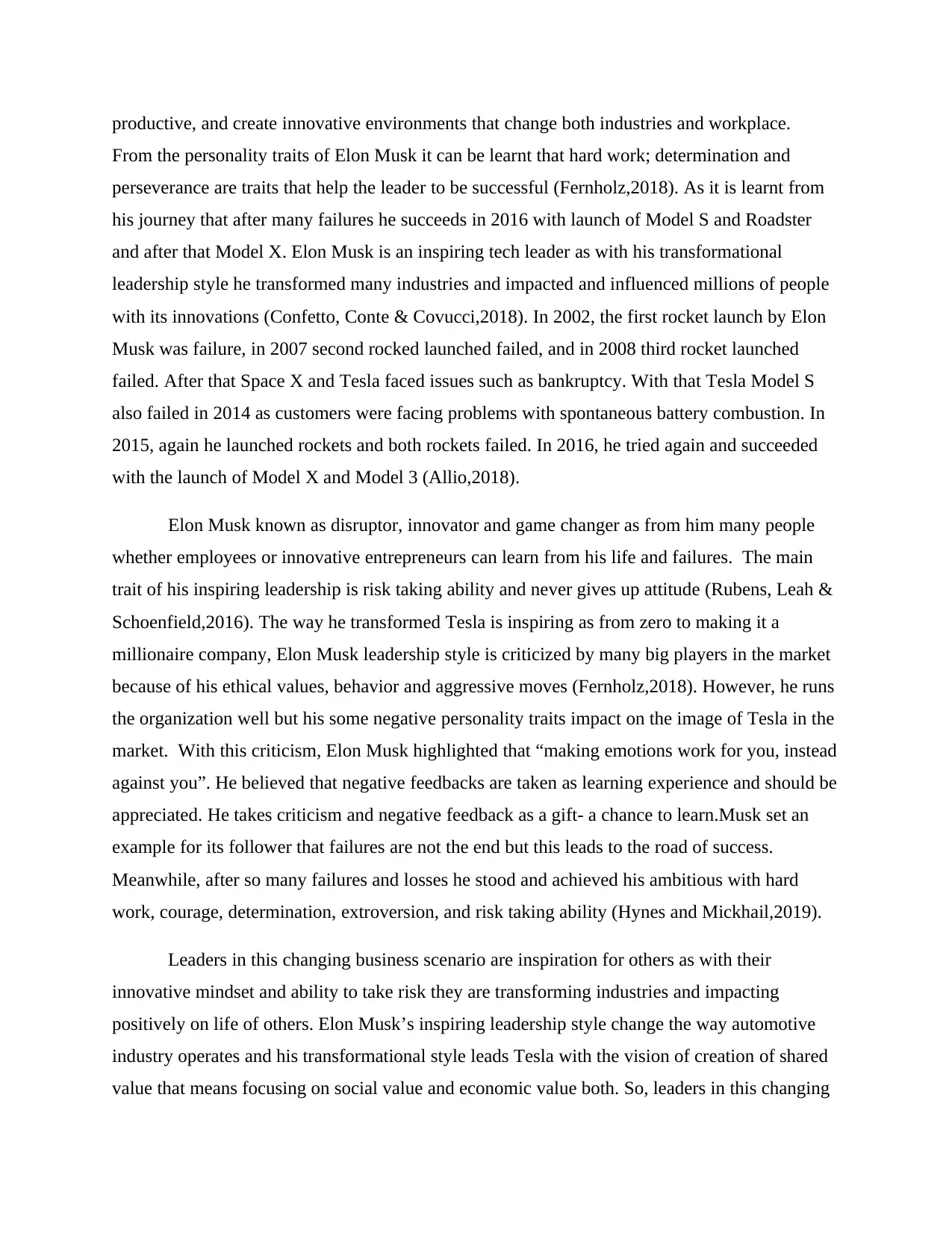
productive, and create innovative environments that change both industries and workplace.
From the personality traits of Elon Musk it can be learnt that hard work; determination and
perseverance are traits that help the leader to be successful (Fernholz,2018). As it is learnt from
his journey that after many failures he succeeds in 2016 with launch of Model S and Roadster
and after that Model X. Elon Musk is an inspiring tech leader as with his transformational
leadership style he transformed many industries and impacted and influenced millions of people
with its innovations (Confetto, Conte & Covucci,2018). In 2002, the first rocket launch by Elon
Musk was failure, in 2007 second rocked launched failed, and in 2008 third rocket launched
failed. After that Space X and Tesla faced issues such as bankruptcy. With that Tesla Model S
also failed in 2014 as customers were facing problems with spontaneous battery combustion. In
2015, again he launched rockets and both rockets failed. In 2016, he tried again and succeeded
with the launch of Model X and Model 3 (Allio,2018).
Elon Musk known as disruptor, innovator and game changer as from him many people
whether employees or innovative entrepreneurs can learn from his life and failures. The main
trait of his inspiring leadership is risk taking ability and never gives up attitude (Rubens, Leah &
Schoenfield,2016). The way he transformed Tesla is inspiring as from zero to making it a
millionaire company, Elon Musk leadership style is criticized by many big players in the market
because of his ethical values, behavior and aggressive moves (Fernholz,2018). However, he runs
the organization well but his some negative personality traits impact on the image of Tesla in the
market. With this criticism, Elon Musk highlighted that “making emotions work for you, instead
against you”. He believed that negative feedbacks are taken as learning experience and should be
appreciated. He takes criticism and negative feedback as a gift- a chance to learn.Musk set an
example for its follower that failures are not the end but this leads to the road of success.
Meanwhile, after so many failures and losses he stood and achieved his ambitious with hard
work, courage, determination, extroversion, and risk taking ability (Hynes and Mickhail,2019).
Leaders in this changing business scenario are inspiration for others as with their
innovative mindset and ability to take risk they are transforming industries and impacting
positively on life of others. Elon Musk’s inspiring leadership style change the way automotive
industry operates and his transformational style leads Tesla with the vision of creation of shared
value that means focusing on social value and economic value both. So, leaders in this changing
From the personality traits of Elon Musk it can be learnt that hard work; determination and
perseverance are traits that help the leader to be successful (Fernholz,2018). As it is learnt from
his journey that after many failures he succeeds in 2016 with launch of Model S and Roadster
and after that Model X. Elon Musk is an inspiring tech leader as with his transformational
leadership style he transformed many industries and impacted and influenced millions of people
with its innovations (Confetto, Conte & Covucci,2018). In 2002, the first rocket launch by Elon
Musk was failure, in 2007 second rocked launched failed, and in 2008 third rocket launched
failed. After that Space X and Tesla faced issues such as bankruptcy. With that Tesla Model S
also failed in 2014 as customers were facing problems with spontaneous battery combustion. In
2015, again he launched rockets and both rockets failed. In 2016, he tried again and succeeded
with the launch of Model X and Model 3 (Allio,2018).
Elon Musk known as disruptor, innovator and game changer as from him many people
whether employees or innovative entrepreneurs can learn from his life and failures. The main
trait of his inspiring leadership is risk taking ability and never gives up attitude (Rubens, Leah &
Schoenfield,2016). The way he transformed Tesla is inspiring as from zero to making it a
millionaire company, Elon Musk leadership style is criticized by many big players in the market
because of his ethical values, behavior and aggressive moves (Fernholz,2018). However, he runs
the organization well but his some negative personality traits impact on the image of Tesla in the
market. With this criticism, Elon Musk highlighted that “making emotions work for you, instead
against you”. He believed that negative feedbacks are taken as learning experience and should be
appreciated. He takes criticism and negative feedback as a gift- a chance to learn.Musk set an
example for its follower that failures are not the end but this leads to the road of success.
Meanwhile, after so many failures and losses he stood and achieved his ambitious with hard
work, courage, determination, extroversion, and risk taking ability (Hynes and Mickhail,2019).
Leaders in this changing business scenario are inspiration for others as with their
innovative mindset and ability to take risk they are transforming industries and impacting
positively on life of others. Elon Musk’s inspiring leadership style change the way automotive
industry operates and his transformational style leads Tesla with the vision of creation of shared
value that means focusing on social value and economic value both. So, leaders in this changing
Paraphrase This Document
Need a fresh take? Get an instant paraphrase of this document with our AI Paraphraser

and stiff business competition are the one who are boosting innovation and inspiring others to
take risk and transform industries.
take risk and transform industries.
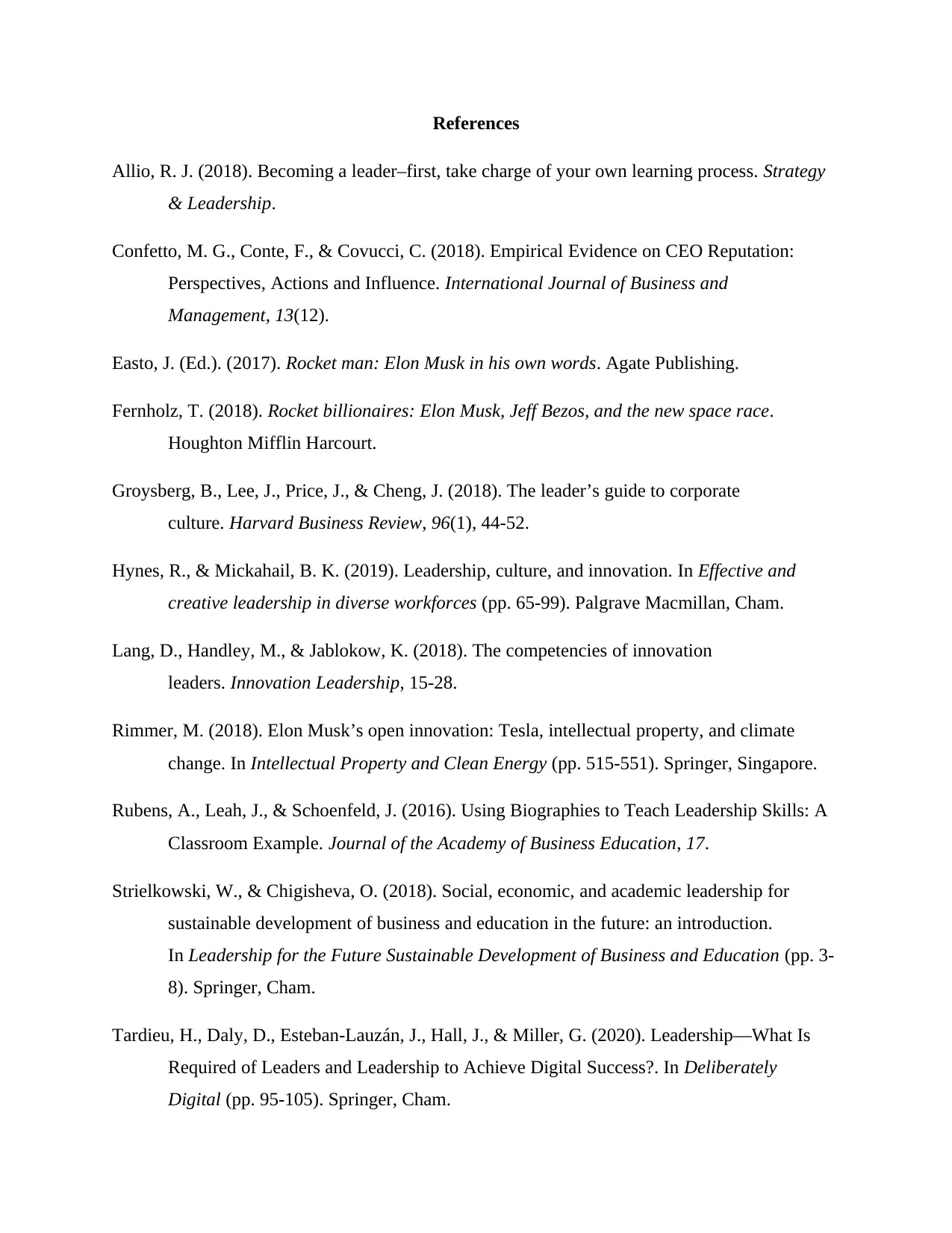
References
Allio, R. J. (2018). Becoming a leader–first, take charge of your own learning process. Strategy
& Leadership.
Confetto, M. G., Conte, F., & Covucci, C. (2018). Empirical Evidence on CEO Reputation:
Perspectives, Actions and Influence. International Journal of Business and
Management, 13(12).
Easto, J. (Ed.). (2017). Rocket man: Elon Musk in his own words. Agate Publishing.
Fernholz, T. (2018). Rocket billionaires: Elon Musk, Jeff Bezos, and the new space race.
Houghton Mifflin Harcourt.
Groysberg, B., Lee, J., Price, J., & Cheng, J. (2018). The leader’s guide to corporate
culture. Harvard Business Review, 96(1), 44-52.
Hynes, R., & Mickahail, B. K. (2019). Leadership, culture, and innovation. In Effective and
creative leadership in diverse workforces (pp. 65-99). Palgrave Macmillan, Cham.
Lang, D., Handley, M., & Jablokow, K. (2018). The competencies of innovation
leaders. Innovation Leadership, 15-28.
Rimmer, M. (2018). Elon Musk’s open innovation: Tesla, intellectual property, and climate
change. In Intellectual Property and Clean Energy (pp. 515-551). Springer, Singapore.
Rubens, A., Leah, J., & Schoenfeld, J. (2016). Using Biographies to Teach Leadership Skills: A
Classroom Example. Journal of the Academy of Business Education, 17.
Strielkowski, W., & Chigisheva, O. (2018). Social, economic, and academic leadership for
sustainable development of business and education in the future: an introduction.
In Leadership for the Future Sustainable Development of Business and Education (pp. 3-
8). Springer, Cham.
Tardieu, H., Daly, D., Esteban-Lauzán, J., Hall, J., & Miller, G. (2020). Leadership—What Is
Required of Leaders and Leadership to Achieve Digital Success?. In Deliberately
Digital (pp. 95-105). Springer, Cham.
Allio, R. J. (2018). Becoming a leader–first, take charge of your own learning process. Strategy
& Leadership.
Confetto, M. G., Conte, F., & Covucci, C. (2018). Empirical Evidence on CEO Reputation:
Perspectives, Actions and Influence. International Journal of Business and
Management, 13(12).
Easto, J. (Ed.). (2017). Rocket man: Elon Musk in his own words. Agate Publishing.
Fernholz, T. (2018). Rocket billionaires: Elon Musk, Jeff Bezos, and the new space race.
Houghton Mifflin Harcourt.
Groysberg, B., Lee, J., Price, J., & Cheng, J. (2018). The leader’s guide to corporate
culture. Harvard Business Review, 96(1), 44-52.
Hynes, R., & Mickahail, B. K. (2019). Leadership, culture, and innovation. In Effective and
creative leadership in diverse workforces (pp. 65-99). Palgrave Macmillan, Cham.
Lang, D., Handley, M., & Jablokow, K. (2018). The competencies of innovation
leaders. Innovation Leadership, 15-28.
Rimmer, M. (2018). Elon Musk’s open innovation: Tesla, intellectual property, and climate
change. In Intellectual Property and Clean Energy (pp. 515-551). Springer, Singapore.
Rubens, A., Leah, J., & Schoenfeld, J. (2016). Using Biographies to Teach Leadership Skills: A
Classroom Example. Journal of the Academy of Business Education, 17.
Strielkowski, W., & Chigisheva, O. (2018). Social, economic, and academic leadership for
sustainable development of business and education in the future: an introduction.
In Leadership for the Future Sustainable Development of Business and Education (pp. 3-
8). Springer, Cham.
Tardieu, H., Daly, D., Esteban-Lauzán, J., Hall, J., & Miller, G. (2020). Leadership—What Is
Required of Leaders and Leadership to Achieve Digital Success?. In Deliberately
Digital (pp. 95-105). Springer, Cham.
⊘ This is a preview!⊘
Do you want full access?
Subscribe today to unlock all pages.

Trusted by 1+ million students worldwide
1 out of 6
Related Documents
Your All-in-One AI-Powered Toolkit for Academic Success.
+13062052269
info@desklib.com
Available 24*7 on WhatsApp / Email
![[object Object]](/_next/static/media/star-bottom.7253800d.svg)
Unlock your academic potential
Copyright © 2020–2026 A2Z Services. All Rights Reserved. Developed and managed by ZUCOL.





